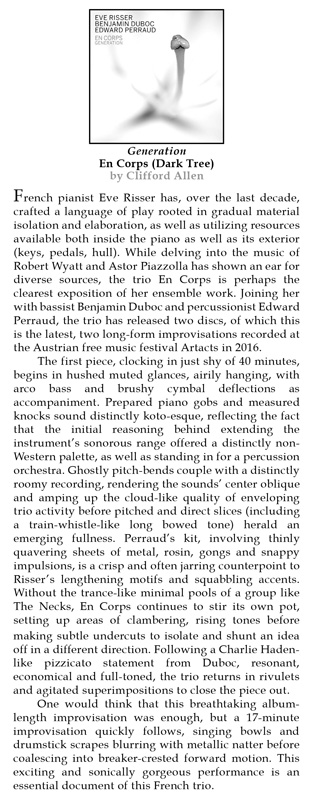févr. 252018
• Chronique par Clifford Allen dans The New York City Jazz Record (Mars 2018)
French pianist Eve Risser has, over the last decade, crafted a language of play rooted in gradual material isolation and elaboration, as well as utilizing resources available both inside the piano as well as its exterior (keys, pedals, hull). While delving into the music of Robert Wyatt and Astor Piazzolla has shown an ear for diverse sources, the trio En Corps is perhaps the clearest exposition of her ensemble work. Joining her with bassist Benjamin Duboc and percussionist Edward Perraud, the trio has released two discs, of which this is the latest, two long-form improvisations recorded at the Austrian free music festival Artacts in 2016.
The first piece, clocking in just shy of 40 minutes, begins in hushed muted glances, airily hanging, with arco bass and brushy cymbal deflections as accompaniment. Prepared piano gobs and measured knocks sound distinctly koto-esque, reflecting the fact that the initial reasoning behind extending the instrument’s sonorous range offered a distinctly non-Western palette, as well as standing in for a percussion orchestra. Ghostly pitch-bends couple with a distinctly roomy recording, rendering the sounds’ center oblique and amping up the cloud-like quality of enveloping trio activity before pitched and direct slices (including a train-whistle-like long bowed tone) herald an emerging fullness. Perraud’s kit, involving thinly quavering sheets of metal, rosin, gongs and snappy impulsions, is a crisp and often jarring counterpoint to Risser’s lengthening motifs and squabbling accents. Without the trance-like minimal pools of a group like The Necks, En Corps continues to stir its own pot, setting up areas of clambering, rising tones before making subtle undercuts to isolate and shunt an idea off in a different direction. Following a Charlie Haden-like pizzicato statement from Duboc, resonant, economical and full-toned, the trio returns in rivulets and agitated superimpositions to close the piece out.
One would think that this breathtaking album length improvisation was enough, but a 17-minute improvisation quickly follows, singing bowls and drumstick scrapes blurring with metallic natter before coalescing into breaker-crested forward motion. This exciting and sonically gorgeous performance is an essential document of this French trio.
The first piece, clocking in just shy of 40 minutes, begins in hushed muted glances, airily hanging, with arco bass and brushy cymbal deflections as accompaniment. Prepared piano gobs and measured knocks sound distinctly koto-esque, reflecting the fact that the initial reasoning behind extending the instrument’s sonorous range offered a distinctly non-Western palette, as well as standing in for a percussion orchestra. Ghostly pitch-bends couple with a distinctly roomy recording, rendering the sounds’ center oblique and amping up the cloud-like quality of enveloping trio activity before pitched and direct slices (including a train-whistle-like long bowed tone) herald an emerging fullness. Perraud’s kit, involving thinly quavering sheets of metal, rosin, gongs and snappy impulsions, is a crisp and often jarring counterpoint to Risser’s lengthening motifs and squabbling accents. Without the trance-like minimal pools of a group like The Necks, En Corps continues to stir its own pot, setting up areas of clambering, rising tones before making subtle undercuts to isolate and shunt an idea off in a different direction. Following a Charlie Haden-like pizzicato statement from Duboc, resonant, economical and full-toned, the trio returns in rivulets and agitated superimpositions to close the piece out.
One would think that this breathtaking album length improvisation was enough, but a 17-minute improvisation quickly follows, singing bowls and drumstick scrapes blurring with metallic natter before coalescing into breaker-crested forward motion. This exciting and sonically gorgeous performance is an essential document of this French trio.
• • • • • • • • • • • • • • • • • • • • • • • • • • • • • • • • • • • • • • • • • • • • • • • • • • • • • • • • • • • • • • • •

Sorry, the comment form is closed at this time.